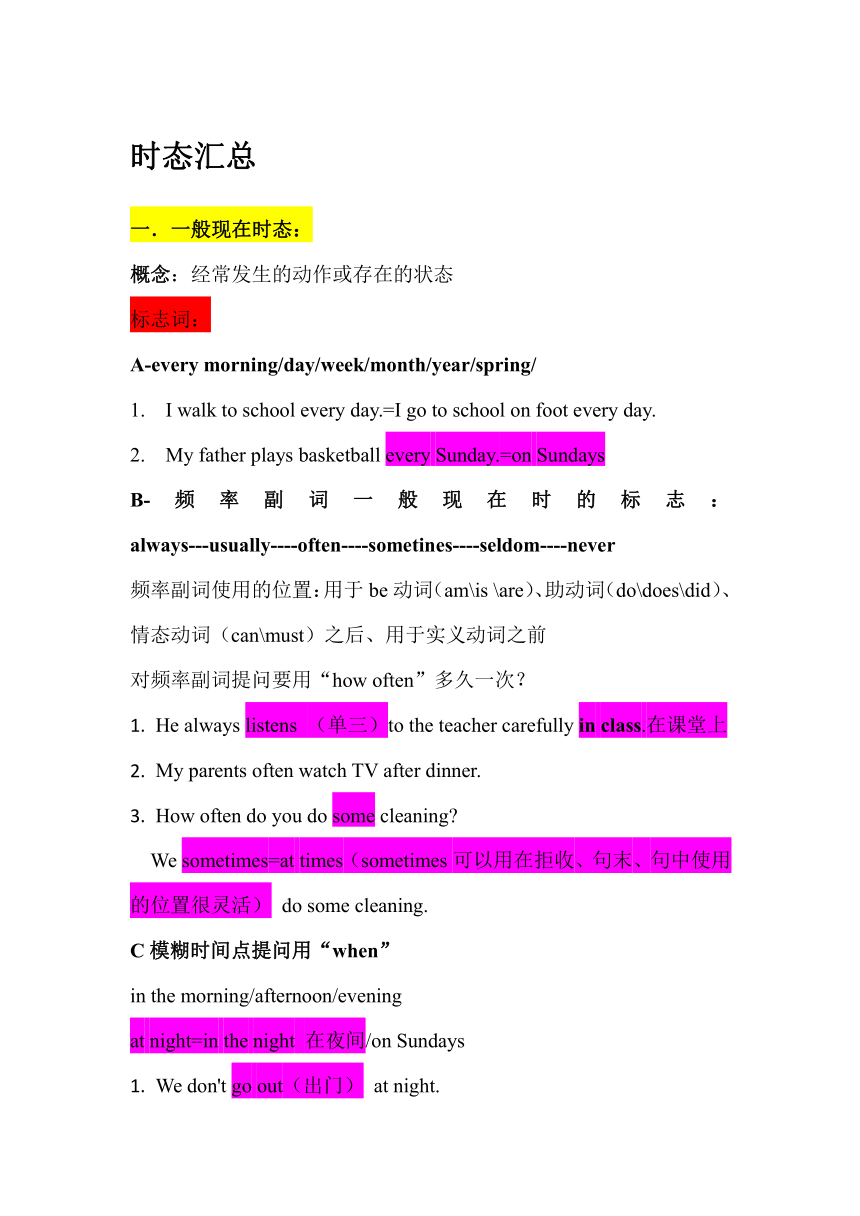
时态汇总 一.一般现在时态: 概念:经常发生的动作或存在的状态 标志词: A-every morning/day/week/month/year/spring/ 1. I walk to school every day.=I go to school on foot every day. 2. My father plays basketball every Sunday.=on Sundays B-频率副词一般现在时的标志:always--usually--often--sometines--seldom--never 频率副词使用的位置:用于be动词(am\is \are)、助动词(do\does\did)、情态动词(can\must)之后、用于实义动词之前 对频率副词提问要用“how often”多久一次? He always listens (单三)to the teacher carefully in class.在课堂上 My parents often watch TV after dinner. How often do you do some cleaning We sometimes=at times(sometimes可以用在拒收、句末、句中使用的位置很灵活) do some cleaning. C模糊时间点提问用“when” in the morning/afternoon/evening at night=in the night 在夜间/on Sundays We don't go out(出门) at night. He gets up at six in the morning. D真理或客观事实、永远的一般现在时 The sun rises in the east and sets in the west.太阳从东方升起来,从西方落下去。 In summer the days are getting longer and longer. China lies in the east of Asia.中国在亚洲的东部 Nothing is difficult if you put your heart into it.世上无难事,只怕有心人。 二.现在进行时态: 概念:现在正在进行或发生的动作 组成形式:be+动词的现在分词 现在分词变化分类: 直接加+ing 例:being,playing,walking,climbing,bring,eating,drinking,flying,drawing 双写+ing(辅元辅组合) 例:beginning,swimming,sitting,getting,cutting,stopping,shopping,running,planning 以不发音的“e”结尾,去“e”+ing 例:writing,making,taking,coming,smiling,having,typing 其中表情感或愿望的,表存在的有,无进行时。 例:like ,want,hope,have 特殊变化 例:tie-tying(系,栓) die-dying(死) lie-lying(躺,撒谎) 标志: A-Now(现在)=at the moment(此时此刻) 例句: What is happening on the road now 路上发生了什么 简短祈使句 例句: 1.Look! He is taking photos(拍照) of the flower. 2.Listen!She is speaking to us. Speak to sb. 3.Don’t talk!My brother is sleeping in the room. 短暂性动词的进行时,可以表将来 例句 The plane is taking off.(1-飞机起飞;2-脱掉衣服) The summer holiday is coming.=is on the way The young tree is dying.(修饰树的词:young、tall) He is leaving for(去往某地) Beijing.他正在去北京 三,一般过去时态: 概念:表示过去发生的动作或存在的状态。 动词过去式变化分类: A-直接加+ed ed:play-played talk-talked answer-answered want-wanted need-needed 双写+ed ed:stop-stopped plan-planned(计划) C-以“e”结尾+d ed:love-loved like-liked arrive-arrived live-lived D-不规则变化 例:sit-sat swim-swam fly-flew run-ran come-came lose-lost E-以“元音+y”结尾,直接+ed;以“辅音+y”结尾,变“y”为“i”直接+ed 例:play-played enjoy-enjoyed carry-carried 标志: yesterday yesterday morning yesterday afternoon... 例句: 1.I had noodles for dinner yesterday.(have.....for.....) 2.We rode bikes to school yesterday morning. (ride-rode)骑 last night last week, last year, the year before last, last spring... 例句: It rained hard / heavily last night(昨夜). He was late to school last Tuesday. 时间段+ago a moment ago=just now,long long ago, th ... ...
~~ 您好,已阅读到文档的结尾了 ~~

